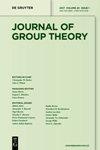A classification of skew morphisms of dihedral groups
IF 0.5
3区 数学
Q4 MATHEMATICS
引用次数: 5
Abstract
Abstract A skew morphism of a finite group 𝐴 is a permutation 𝜑 of 𝐴 fixing the identity element and for which there is an integer-valued function 𝜋 on 𝐴 such that φ ( x y ) = φ ( x ) φ π ( x ) ( y ) \varphi(xy)=\varphi(x)\varphi^{\pi(x)}(y) for all x , y ∈ A x,y\in A . In this paper, we restrict ourselves to the case when A = D n A=D_{n} , the dihedral group of order 2 n 2n . Wang et al. [Smooth skew morphisms of dihedral groups, Ars Math. Contemp. 16 (2019), 2, 527–547] determined all 𝜑 under the condition that π ( φ ( x ) ) ≡ π ( x ) ( mod | φ | ) ) \pi(\varphi(x))\equiv\pi(x)\pmod{\lvert\varphi\rvert}) holds for every x ∈ D n x\in D_{n} , and later Kovács and Kwon [Regular Cayley maps for dihedral groups, J. Combin. Theory Ser. B 148 (2021), 84–124] characterised those 𝜑 such that there exists an inverse-closed ⟨ φ ⟩ \langle\varphi\rangle -orbit, which generates D n D_{n} . We show that these two types of skew morphisms comprise all skew morphisms of D n D_{n} . The result is used to classify the finite groups with a complementary factorisation into a dihedral and a core-free cyclic subgroup. As another application, a formula for the total number of skew morphisms of D p t D_{p^{t}} is also derived for any prime 𝑝.二面体群的偏斜态射分类
摘要有限群的偏态射是一个固定单位元的变量的置换,对于这个置换,存在一个整数值函数,使得对于A x,y \in A, φ∞(x) y = φ∞(x)∞(x)∞(x)∞(y) \varphi (xy)= \varphi (x) \varphi{ ^ }{\pi} (x)(y)。在本文中,我们限制了当A= dn A={D_n}, 2次方n 2n的二面体群。Wang et al.[二面体群的光滑倾斜态射,数学学报。]当代16(2019),2,527 - 547]在π (φ (x))≡π (x) (mod | φ |) \pi (\varphi (x)) \equiv\pi (x) \pmod{\lvert\varphi\rvert})对每个x∈dn x \in D_n{成立的条件下确定了所有的变量,后来Kovács和Kwon[二面体群的正则Cayley映射,J. Combin]。理论SerB 148(2021), 84-124]表征了那些变量,使得存在一个反封闭的⟨φ⟩}\langle\varphi\rangle -轨道,它产生了dn {D_n}。我们证明了这两种类型的倾斜态射包含了{dnd_n}的所有倾斜态射。利用这一结果将具有互补分解的有限群划分为二面体和无核循环子群。作为另一个应用,对于{任意素数𝑝,也导出了{pdtd_p ^}}t的偏态射总数的公式。
本文章由计算机程序翻译,如有差异,请以英文原文为准。
求助全文
约1分钟内获得全文
求助全文
来源期刊

Journal of Group Theory
数学-数学
CiteScore
1.00
自引率
0.00%
发文量
45
审稿时长
6 months
期刊介绍:
The Journal of Group Theory is devoted to the publication of original research articles in all aspects of group theory. Articles concerning applications of group theory and articles from research areas which have a significant impact on group theory will also be considered.
Topics:
Group Theory-
Representation Theory of Groups-
Computational Aspects of Group Theory-
Combinatorics and Graph Theory-
Algebra and Number Theory
 求助内容:
求助内容: 应助结果提醒方式:
应助结果提醒方式:


